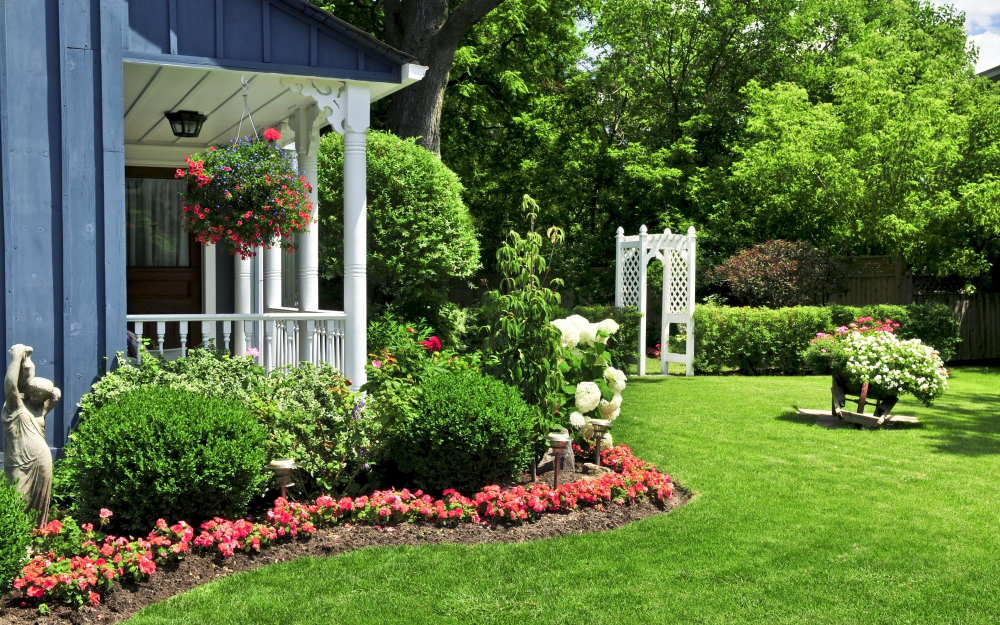Eco-Friendly Landscaping Practices Can Revitalize Your Home - Part 2
 The first part of this blog covered how eco-friendly landscaping practices can help reduce your home’s power consumption, making the home itself greener. While that is a major benefit, there are many more advantages too.
The first part of this blog covered how eco-friendly landscaping practices can help reduce your home’s power consumption, making the home itself greener. While that is a major benefit, there are many more advantages too.
- Much of the country, and California in particular, has suffered from drought in the last few years. Water conservation is not just a civic responsibility, it will also help control your ever-increasing water bills. Among the simple ways to conserve water are:
- Planting drought-resistant lawns and native plants.
- Collecting rainwater for use in the garden.
- Using irrigation systems that allow for controlling the amount of water used.
- The benefits of using plants local to the area include reduced care and maintenance compared to the care needed for delicate species brought in from other areas. Another benefit is that they are usually more resistant to local pests, reducing the need for costly insecticides.
- A multi-level garden, besides storing rainwater, will also allow rainwater to flow to the lower levels and then to the soil. This will also divert water away from the building’s foundation, preventing possible seepage into the foundation and basement.
- If installing a drip irrigation system is possible, this will deliver water directly to the plant roots, thereby maximizing soil moisture and reducing evaporation wastage.
- Mulching is an effective way to conserve water. A layer of organic matter placed around tree trunks and plants will keep the soil around the plants and trees moist and healthy. It will also work to suppress weed growth.
- Recycling need not be limited to the indoors. Using reclaimed stones, concrete slabs, bricks, etc. for hardscaping is a great way to increase the environment-positive impact of your garden.
- Using permeable blocks for the hardscape means that the porosity allows water to seep into the soil below, helping to recharge the groundwater. If permeable blocks are not viable, leaving gaps between nonpermeable blocks will achieve the same purpose.
- Composting gives you a free source of nutrient-rich fertilizer that is organic and environment-friendly. The savings in terms of reduced purchase of costly chemical fertilizers can be significant.
- Creating a miniature wildlife habitat has many benefits. A garden that attracts bees, butterflies, and birds means that creatures that eat plant-destroying pests will be around to protect your plants. Plants that produce nectar, berries, and seeds are a good way of attracting bees and birds. Installing birdboxes or a small waterbody will not only add to the appeal of your landscape but will also attract the wildlife you want.
Also Read: Planting for Tomorrow: Building an Eco-Friendly and Future-Proof Garden
An eco-friendly landscape does not need to look wild and overgrown. It can be as elegant, functional, and practical as you want it to be. Whatever you use the garden for – relaxation, exercise, entertainment or more, eco-friendly ways to create the space you want are available. The ideas mentioned here are only the tip of the iceberg. If you are looking for an eco-friendly garden you can be proud of, contact a landscaping professional who will be able to work with you to create the landscape you want. Being environment-friendly is a great way to revitalize your home.
Frequently Asked Questions
1. What are eco-friendly landscaping practices?
Eco-friendly landscaping uses sustainable techniques like using native plants and water-saving methods to create a beautiful, low-maintenance garden.
2. How do native plants benefit my landscape?
Native plants need less water, require less care, and are more resistant to local pests, making them an ideal choice for an eco-friendly garden.
3. How can I conserve water in my garden?
Use drought-resistant lawns, collect rainwater, install drip irrigation, and mulch around plants to keep the soil moist and reduce water waste.
4. What is the benefit of using permeable blocks in landscaping?
Permeable blocks allow water to seep through, helping to recharge groundwater and prevent water accumulation near your home’s foundation.
5. How does composting improve my garden?
Composting produces nutrient-rich fertilizer naturally, reducing the need for chemical fertilizers while improving soil health.
6. What are the best landscape planters in San Jose for eco-friendly landscaping?
For eco-friendly landscaping, explore landscape planters in San Jose offered by Dooling Landscape Service. Their sustainable options are designed for local conditions and support water conservation practices.
- Feb 13, 2025
